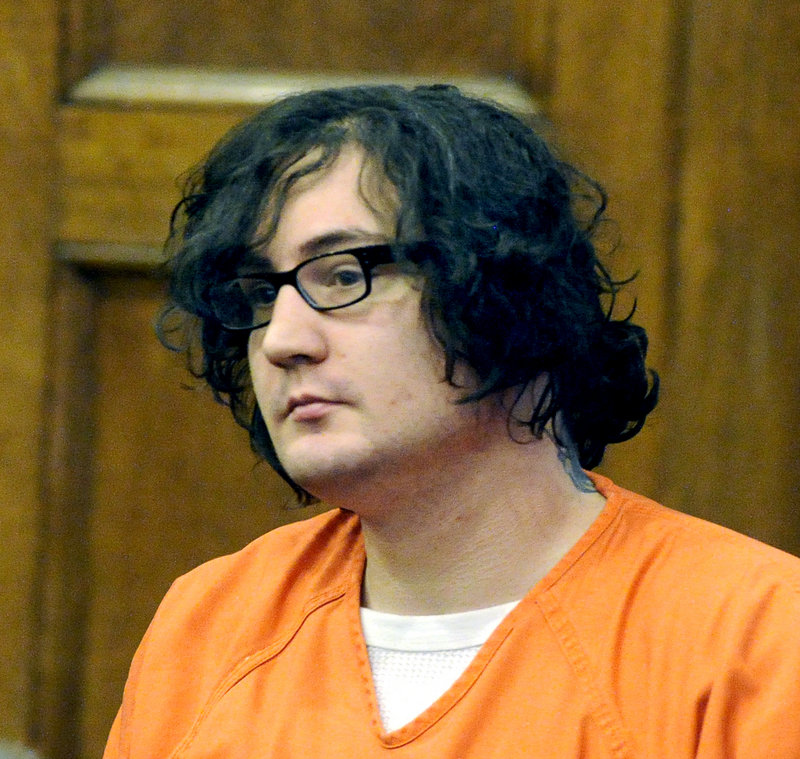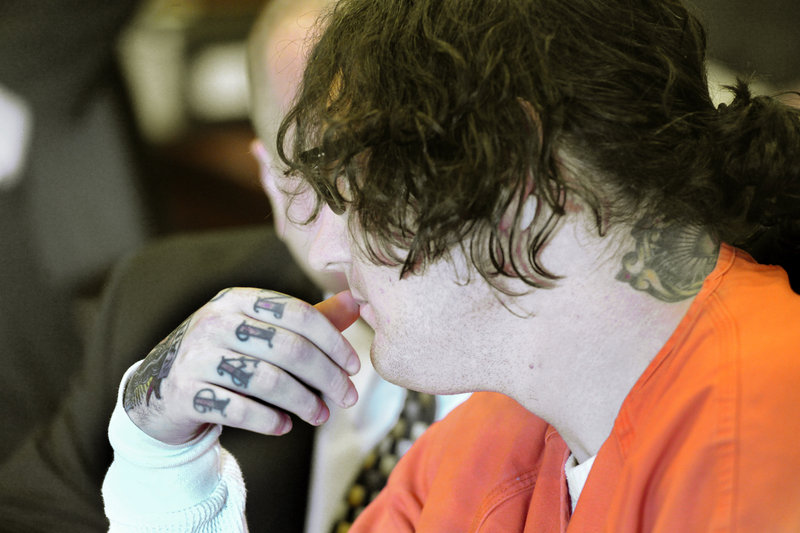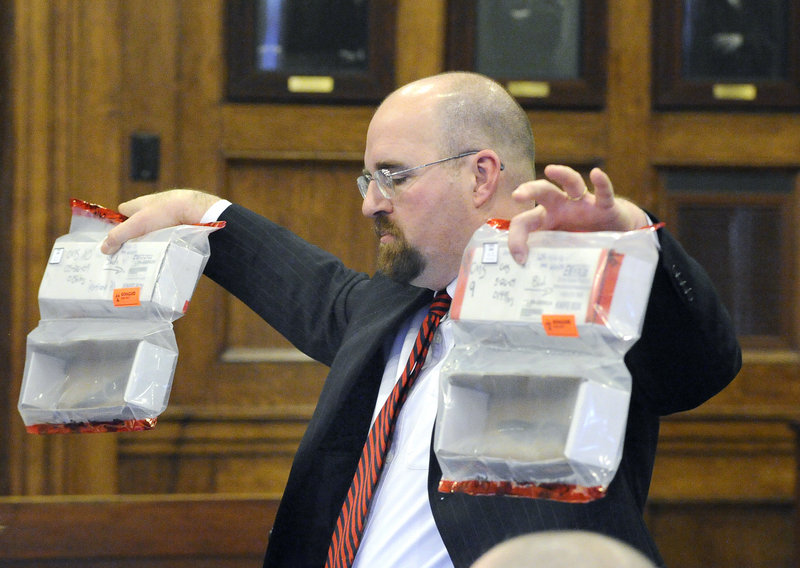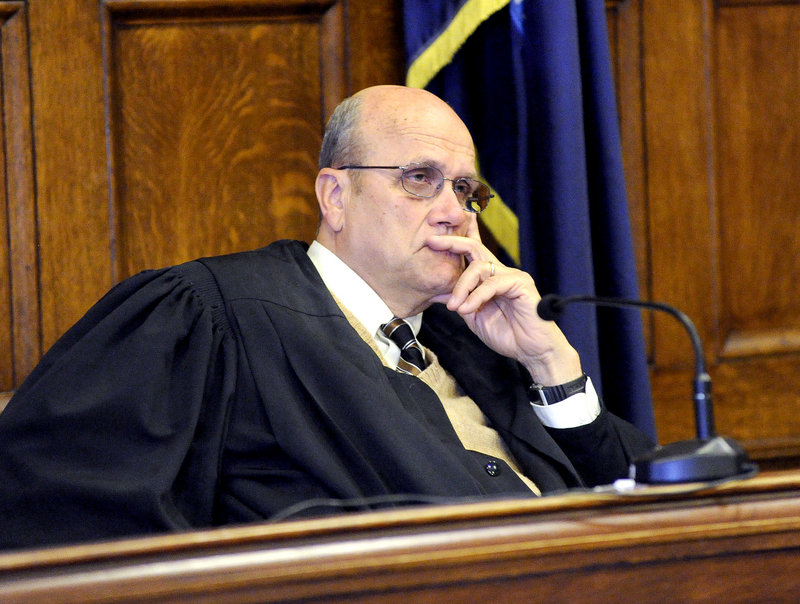PORTLAND — Chad Gurney’s voice sounded tired. He spoke slowly, calmly and without inflection.
“I had so much going for me, and today, I just lost my mind,” Gurney said as the woman on the other end of the telephone line, an Old Orchard Beach police officer, listened.
It was around 4 a.m. on May 26, 2009, and Gurney was speaking to police from Room 107 at the Crest Motel. He wanted to turn himself in for the brutal killing of 18-year-old Zoe Sarnacki at his apartment in Portland about 10 hours earlier.
As a SWAT team prepared to take Gurney into custody, he spoke to officer Jami Ladakakos about his past, his strained relationships with his parents, his paranoia, his delusions and a van crash in 2005 that nearly killed him.
On Monday, the opening day of Gurney’s murder trial, prosecutors played the recording of that hour-long conversation to Justice Roland Cole in Cumberland County Superior Court.
“I was going to start a new beginning,” said Gurney, who was 27 at the time. He told Ladakakos he had shaved his head recently and had arranged a trip to Thailand, part of a spiritual quest, but “it didn’t quite work out as planned.”
“I really hurt a lot of people today. I just feel so sorry for it. Everyone had given me so much pain, and today it caught up and I gave it back,” he said. “I screwed everything up today.”
Was it the voice of a deeply troubled yet sane young man who had just committed intentional and knowing murder? Or was it the voice of someone who was so delusional when he killed Sarnacki that he was unable to understand the consequences of his actions?
That’s the judgment that Cole will have to make at the conclusion of the trial sometime next week, after he has heard all the evidence and testimony from psychologists who have competing opinions about the workings of Gurney’s mind.
Gurney has pleaded not criminally responsible by reason of insanity. He has waived his right to a jury, so his legal fate rests solely with the judge.
If he is found guilty, Gurney will face a minimum of 25 years and a maximum of life in prison. If Cole finds him not criminally responsible, Gurney will be committed to the Riverview Psychiatric Center in Augusta until he can prove to the court that he is no longer a threat to society.
The prosecution and the defense laid out their positions during opening statements Monday.
Assistant Attorney General Donald Macomber said Gurney was not only legally sane when he killed Sarnacki, he was planning an insanity defense within hours of committing the crime.
During a cell phone call with his best friend, Corey Bryant, Gurney told Bryant to tell police that he hadn’t been “all there” mentally since the van crash, in which Gurney suffered a brain injury, a broken back and other serious injuries.
“This will not even be a close case for you, your honor,” Macomber said.
“Chad Gurney was rational and responsive throughout his interview” with Portland police Detective Scott Dunham on the morning after the killing, Macomber said. “He had the capacity to appreciate the wrongfulness of his actions.
“He described himself as a monster. … He said that he did the most horrific deeds that anyone could possibly do.”
Gurney’s lawyers don’t dispute that the 29-year-old defendant felt remorseful for taking Sarnacki’s life on May 25, 2009. But they argue that Gurney was legally insane at the time.
Attorney Sarah Churchill told Cole that Gurney suffered from a psychotic disorder, marked by intense delusions. He was on a spiritual quest and believed that he was being guided by symbols, Churchill said.
She said Gurney’s state of mind was caused primarily by the lingering effects of the brain injury he sustained in the van crash.
“He was not appropriately medicated to deal with his thought, mood and pain disorders,” Churchill told Cole. “The goals of Mr. Gurney’s behavior were entirely based on delusions.”
Gurney was a standout lacrosse goalie at Oak Hill High School in Wales, and went on to play for Liberty University in Lynchburg, Va.
In 2005, Gurney and his teammates were on their way to a match in two vans when a collision knocked one of them into the path of a tractor-trailer. Gurney moved back to Maine to recover, and had more than 20 surgeries, the last one in early 2009.
Gurney received a seven-figure settlement from Liberty University, and lived comfortably on a monthly disbursement. He met Sarnacki, a former Deering High School student, at a tattoo shop in Portland’s Old Port.
Like Gurney, Sarnacki had an interest in world religions, spirituality and cultures.
Macomber said they started dating, but they were not exclusive. He said Gurney went to Vancouver in May 2009, and when he returned Sarnacki told him that she had seen someone else while he was traveling.
Gurney asked Sarnacki to quit her job at a bagel shop and travel with him, but she refused, Macomber said.
On the afternoon of May 25, Gurney strangled Sarnacki in the loft of his apartment on Cumberland Avenue. He had sex with her corpse, decapitated her with multiple knives and set her body on fire. Gurney admitted all of that to detectives the next morning.
During a mental evaluation in June 2009, Macomber said, Gurney said that he didn’t want to claim an insanity defense and “cower away at Riverview.”
Bryant, Gurney’s onetime best friend who now lives in Florida, was one of the state’s first witnesses Monday.
Bryant said he learned about the murder on the night it happened, from a friend and from Portland police officers who showed up at his apartment to ask him about Gurney.
Bryant went for a drive around 2 a.m., because he was agitated and he didn’t want to be in his apartment. Gurney, who had checked into the motel in Old Orchard Beach, called Bryant’s cell phone.
“I asked him if he had murdered someone,” Bryant testified. He said Gurney admitted to killing Sarnacki.
“He told me she had done something that had hurt him, and he lost it,” Bryant said.
Bryant ran a red light on Congress Street and was pulled over by Portland police Officer Jason King. Bryant continued to talk with Gurney. He said Gurney told him to tell the police about the van crash, and say he had not been mentally stable since it happened.
Bryant handed the phone to King, who kept Gurney on the phone for more than an hour. The officer convinced Gurney to stay at the motel while Old Orchard Beach police prepared a team to take him into custody.
Then, officer Ladakakos called Gurney on the line in his motel room, and spoke with him for about an hour. Gurney surrendered without incident.
Staff Writer Trevor Maxwell can be contacted at 791-6451 or at: tmaxwell@pressherald.com
Send questions/comments to the editors.






Success. Please wait for the page to reload. If the page does not reload within 5 seconds, please refresh the page.
Enter your email and password to access comments.
Hi, to comment on stories you must . This profile is in addition to your subscription and website login.
Already have a commenting profile? .
Invalid username/password.
Please check your email to confirm and complete your registration.
Only subscribers are eligible to post comments. Please subscribe or login first for digital access. Here’s why.
Use the form below to reset your password. When you've submitted your account email, we will send an email with a reset code.